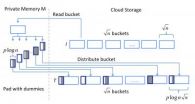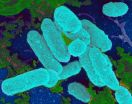(Press-News.org) Manchester scientists have shown that a new drug could prove useful in treating small cell lung cancer - the most aggressive form of lung cancer.
Scientists from the Cancer Research UK Manchester Institute, based at The University of Manchester and part of the Manchester Cancer Research Centre, teamed up with experts at AstraZeneca, as part of a collaboration agreed in 2010, to test a drug – known as AZD3965 - on small cell lung cancer cells.
The research, published in the journal Clinical Cancer Research, also helps identify which patients are most likely to respond to the treatment.
One treatment approach currently being investigated by cancer scientists is finding drugs that exploit the change in energy production in tumours. In cancer cells there is a switch to using glycolysis, a process that requires less oxygen and produces lactate as a by-product. Certain molecules – monocarboxylate transporters (MCTs) – are involved in the movement of lactate out of cells and drugs that target MCTs have been shown to stop tumour growth.
The Manchester researchers tested a new drug that targets one of these molecules, MCT1, in lung cancer cells and in mouse models.
Professor Caroline Dive, who led the research, said: "Small cell lung cancer has a dismal prognosis and we have seen little improvement in treatment for many years. More targeted therapies are needed to help those patients whose tumours become resistant to chemotherapy. This new drug – AZD3965 – is currently in clinical trials, but it has not yet been tested in small cell lung cancer."
The team investigated the sensitivity of small cell lung cancer cells to AZD3965 and showed that in those cells lacking an alternate lactate transporter, MCT4, the drug had an effect. They found that the drug increased the level of lactate in cells and, more importantly, reduced tumour growth.
They then looked at tumour samples taken from lung cancer patients and found that high levels of MCT1 were linked to worse patient prognosis.
Professor Dive added: "We propose that this drug will be most useful in this subset of patients who have elevated MCT1 levels and need more effective treatments.
"Our laboratory results are promising and certainly provide encouragement to test this treatment clinically in patients with small cell lung cancer."
Susan Galbraith, head of the oncology innovative medicines unit at AstraZeneca, said: "Lung cancer is still the leading cancer killer, and we are working on a number of potential treatment options that could provide patients with a better chance of beating the disease. Targeting tumour cell metabolism represents a novel and exciting approach, and we are delighted to be working with The University of Manchester and Cancer Research UK to investigate the utility of AZD 3965 as a potential novel cancer treatment."
INFORMATION: END
New drug active against most aggressive type of lung cancer cells
2014-07-10
ELSE PRESS RELEASES FROM THIS DATE:
New therapeutic combination to slow resistant sarcomas
2014-07-10
Researchers at sarcomas research group at the Bellvitge Biomedical Research Institute (IDIBELL) and the Catalan Institute of Oncology (ICO) have been tested in 19 patients a new therapeutic combination to combat resistant sarcomas. The clinical trial results, which indicate that the new treatment could stabilize the growth of these tumors have been published this week in the British Journal of Cancer.
Sarcomas
Sarcomas are a rare type of tumor and complex since there are several subtypes. It can affect from children to older ages. It is usually diagnosed in advanced and ...
'Melbourne Shuffle' secures data in the cloud
2014-07-10
PROVIDENCE, R.I. [Brown University] — To keep data safe in the cloud, a group of computer scientists suggests doing the Melbourne Shuffle.
That may sound like a dance move (and it is), but it's also a computer algorithm developed by researchers at Brown University.
The computing version of the Melbourne Shuffle aims to hide patterns that may emerge as users access data on cloud servers. Patterns of access could provide important information about a dataset — information that users don't necessarily want others to know — even if the data files themselves are encrypted.
"Encrypting ...
The bigger the better: Cigarette warning labels prompt quit attempts
2014-07-10
WASHINGTON - Cigarette warning labels can influence a smoker to try to quit even when the smoker is trying to avoid seeing the labels, according to a survey of thousands of adult smokers in four countries published by the American Psychological Association.
Small, text-only warning labels like those on cigarette packs in the United States prompt people to think about health risks of smoking, and people who notice the warnings regularly are more likely to try to quit, the research found. Larger, more graphic warning labels like those in other countries, such as Australia, ...
Radio-burst discovery deepens astrophysics mystery
2014-07-10
The discovery of a split-second burst of radio waves by scientists using the Arecibo radio telescope in Puerto Rico provides important new evidence of mysterious pulses that appear to come from deep in outer space.
The finding by an international team of astronomers, published July 10 in The Astrophysical Journal, marks the first time that a so-called "fast radio burst" has been detected using an instrument other than the Parkes radio telescope in Australia. Scientists using the Parkes Observatory have recorded a handful of such events, but the lack of any similar findings ...
Working to loosen the grip of severe mental illness
2014-07-10
A neuroscientist at Rutgers University-Newark says the human brain operates much the same whether active or at rest – a finding that could provide a better understanding of schizophrenia, bipolar disorder and other serious mental health conditions that afflict an estimated 13.6 million Americans.
In newly published research in the journal Neuron, Michael Cole, an assistant professor at the Center for Molecular and Behavioral Neuroscience, determined that the underlying brain architecture of a person at rest is basically the same as that of a person performing a variety ...
How antioxidants can accelerate cancers, and why they don't protect against them
2014-07-10
Cold Spring Harbor, NY – For decades, health-conscious people around the globe have taken antioxidant supplements and eaten foods rich in antioxidants, figuring this was one of the paths to good health and a long life.
Yet clinical trials of antioxidant supplements have repeatedly dashed the hopes of consumers who take them hoping to reduce their cancer risk. Virtually all such trials have failed to show any protective effect against cancer. In fact, in several trials antioxidant supplementation has been linked with increased rates of certain cancers. In one trial, ...
Depressed men with prostate cancer are diagnosed later stage, get less effective therapies
2014-07-10
Depressed men with localized prostate cancer were more likely to be diagnosed with more aggressive prostate cancer, received less effective treatments and survived for shorter times than prostate cancer patients who were not depressed, a UCLA study has found.
The negative outcomes may be the result of several factors such as bias against the mentally ill, depression's impact on biological cancer processes, the depressed man's lack of investment in his general health and disinterest in receiving more effective care, and missed opportunities by physicians to educate patients ...
Scientist finds link between antibiotics, bacterial biofilms and chronic infections
2014-07-10
Researchers from the University of Southern California and the Oak Crest Institute of Science have discovered the link between antibiotics and bacterial biofilm formation leading to chronic lung, sinus and ear infections. The study results, published in the current issue of PLOS ONE, illustrate how bacterial biofilms can actually thrive, rather than decrease, when given low doses of antibiotics.
"This research addresses the long standing issues surrounding chronic ear infections and why some children experience repeated ear infections even after antibiotic treatment," ...
BMSCs with Nogo-66 receptor gene silencing for repair of spinal cord injury
2014-07-10
After central nervous system injury, the increase in Nogo protein is mediated by Nogo-66 receptor gene, leading to the collapse of growth cones and inhibiting the extension of neuronal neurites. Zhiyuan Li and his team, Heibei Xingtai People's Hospital, China used RNA interference to silence Nogo-66 receptor gene expression in bone marrow mesenchymal stem cells (BMSCs), blocked the inhibitory effect of Nogo protein, promoted the process growth of neurons differentiated by transplanted cells, improved the therapeutic effects and increased the success rate of BMSCs transplantation ...
Inhibition of NgR expression reduces apoptotic retinal ganglion cells in diabetes
2014-07-10
Activation of Nogo receptor (NgR) is an essential factor of nerve regeneration inhibition, neuronal atrophy and even apoptosis. Upregulation of NgR expression is an important cause of cell apoptosis and visual extinction in some diseases including glaucoma. Whether ganglion cell apoptosis is related to NgR gene expression in diabetes mellitus remains poorly understood. Dr. Xuezheng Liu and his team, Liaoning Medical University, China interfered NgR expression in the retinal ganglion cells of rats with diabetes mellitus and found that Rho kinase expression was obviously ...








